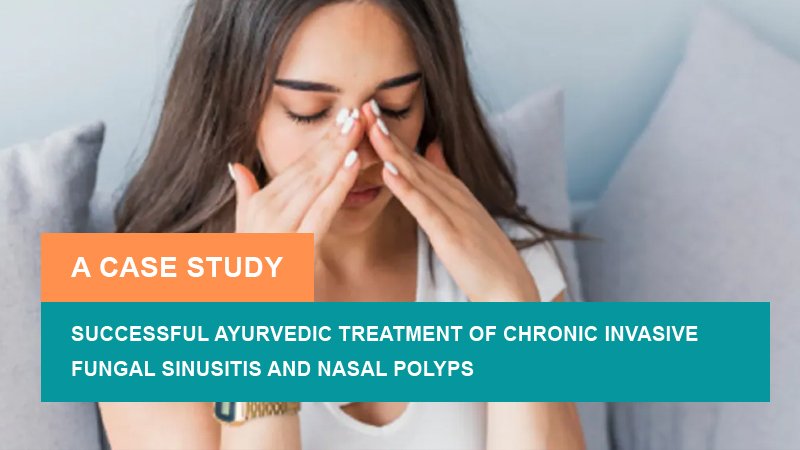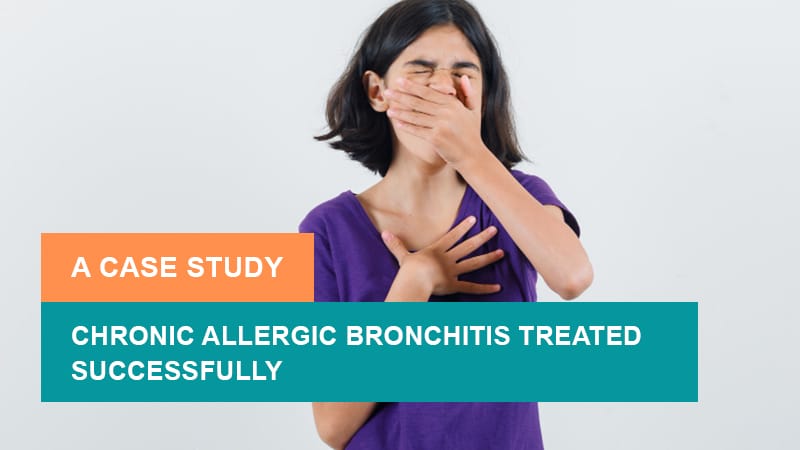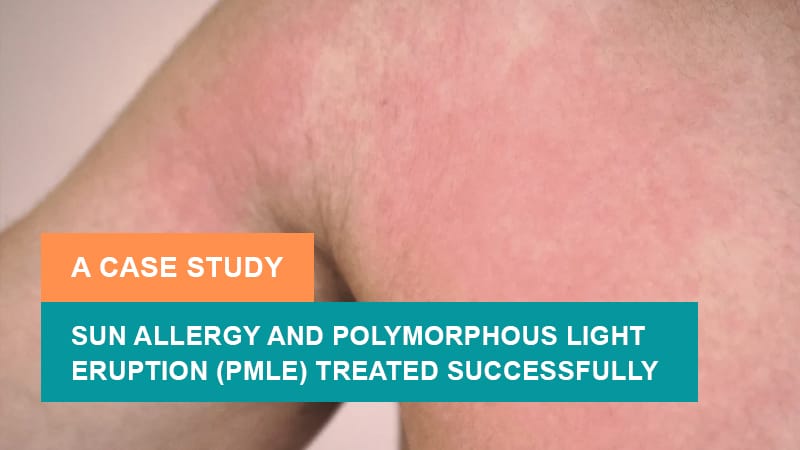Mena, residing in Hyderabad, India consulted IAFA online after getting tired of using alternative therapies and still suffering from ever-haunting symptoms of Fungal Sinusitis and Nasal Polyps. Mena has undergone strategic and personalized treatment for 3 months and recovered completely from both conditions. Through this case study, let’s get to know the previous state of the patient, her 3 months therapy plan, and the state of the disease after getting treated at IAFA. We will show you the comprehensive plan for the Ayurvedic Treatment of Chronic Invasive Fungal Sinusitis and Ayurvedic Treatment of Nasal Polyps.
Mena has been suffering from Chronic Invasive Fungal Sinusitis and Nasal Polyps for the past few years and she had suffered a lot from the symptoms which would worsen in the winter. She tried every therapy doctor suggested to her but the results were not promising. Luckily she visited IAFA where her allergies and sinusitis got treated. Not only Mena even you can get your allergies treated at IAFA with a personalized diet and strategic treatment plan.
Case Details
- Name: Mena
- Age: 45 years
- Gender: Female
- UID no: 6959
- DOA: 2/3/2022
- Place: Hyderabad, India
A Brief Introduction of the Patient
Mena has been suffering from Nasal Allergies for the past few years and the symptoms were continuous sneezing, runny nose, difficulty in breathing, and disturbed sleep. She was having a severe headache, disturbed sleep, and loss of smell and taste. She had two surgeries, one for Nasal Polyps in 2013 and one for FESS surgery in 2018.
Introduction of Chronic Invasive Fungal Sinusitis
Ayurveda explains Fungal Sinusitis as Kaphaj Pratishyay. Fungal sinusitis is a sinus infection that is caused due to fungus. Research studies show that a weakened immune system is the main cause of this infection. There are different types of fungal sinusitis, some may destroy the lining of the nose and spread to the brain, causing death in rare conditions. To further understand in detail the topic, let’s divide it into mini parts.
What are Sinuses?
Sinuses in our skull are empty, interconnected spaces and can be extended to the forehead, cheekbones, nose, and eyes. These sinuses trap the bacteria and keep the air inside its walls moist.
What is Sinusitis?
Sinusitis is the inflammation of the sinus walls where the sinuses get blocked and dis-regulate their function.
What is Fungal Sinusitis?
Fungal sinusitis can be defined as the inflammation of the walls of the sinuses due to the accumulation of fungus. Many researchers classify fungal sinusitis into two types:-
- Invasive Fungal Sinusitis can spread to other parts like the eyes, brain, and nose.
- Non-invasive Fungal Sinusitis doesn’t spread to the other parts.
So, you might have got an idea of what our patient is suffering from.
Symptoms of Chronic Invasive Fungal Sinusitis
- Fever
- Runny nose
- Watery eyes
- Facial swelling and tenderness
- Frequent flu and cough
- Sinus Headache
- Inflammation in the sinuses
- Loss of smell sensation and taste.
Causes of Chronic Invasive Fungal Sinusitis
Wikipedia states that around 90% of fungal sinusitis is due to the fungus, Aspergillus.
What are Nasal Polyps?
Nasal Polyps can be defined as benign growth in the sinuses or the walls of the nose.
Symptoms of Nasal Polyps
- Fever
- Stuffy Nose
- Runny nose
- Post nasal drip.
Causes of Nasal Polyps
दोपैस्त्रिभिस्तैःपृथगेकशश्च l
ब्रूयात्तथाऽसितथैवशोफान् ll
The above shloka elucidates Nasal Polyps. Ayurveda considers Nasal Polyps as one of the Nasarsha and refers to them as Kapha Rakta grandhis, where abnormal lesions can occur in any of the nasal mucosa or para nasal sinuses. As per Acharya Sushruta, Nasal Polyps can be of 4 types:-
- Vataj
- Kapha
- Pitta
- Sannipataj.
Symptoms of Nasal Polyps – As Per Ayurveda
- Blocked nose
- Difficulty in breathing through nostrils
- It worsened during the night.
- Nasal congestion
- Post Nasal drip
- Reduced sensation to smell.
- Headaches
- Heaviness in the nose and forehead
- Shallow breathing
Causes of Nasal Polyps – As Per Ayurveda
Some people develop Nasal Polyps without any previous nasal issues, but the following can be triggering agents for the development of Nasal Polyps:-
- Previous sinus infection
- Cystic Fibrosis
- Asthma
- Allergic Rhinitis
- Being sensitive to certain drugs like NSAIDs.
- Hay Fever
Final Diagnosis
Dr. Sahil Gupta asked the patient to get tested for fungal culture.
From the given lab reports, it’s concluded that the patient is suffering from:-
- Kaphaja Pratishyay (Chronic Fungal Sinusitis)
- Nasarasha (Nasal Polyps)
Treatment of Chronic Invasive Fungal Sinusitis and Nasal Polyps at IAFA Ayurveda
IAFA Ayurveda divides the treatment plan into two parts:-
- External Treatment Procedure.
- Internal Treatment Procedure.
Let’s get to know in detail about the treatment plan and how our patient got treated successfully at IAFA within 3 months.
A. External Procedure
Pratimarsha Nasya Karma
It’s an Ayurvedic procedure where the patient instils nasal drops followed by inhalation of steam to clear the mucus and free the nasal passages. Dr. Sahil Gupta advised the patient of the following procedure:-
1. Nasal All Clear X Drop
Method of Usage: Instill 4-6 drops in the bilateral nostrils, twice a day, one in the morning and one in the evening. After instilling the Nasal All Clear X Drops, take steam. Steam helps in clearing the mucus in the nasal and sinus walls thereby clearing the air passages. After taking steam, use Nasal Air.
2. Nasal Air
It is a dhoomapanam wick which has to burn to inhale through alternate nostrils once a day.
Method of Usage: One end of the wick is burned and the flame should be stopped. The medicated smoke coming out of the wick can be inhaled through alternate nostrils and eliminated by oral route.
B. Internal Procedure
3. IAFA Swaras Chikitsa – Total Care 3X Ras
- Swaras helps in treating the underlying condition and also immunises the body.
- It is safer to use in healthy individuals.
Dose:- 30 ml with equal quantity of water twice a day early morning and early evening.
4. IAFA AF-7 Tablet
- Treats chronic ailments
- Boosts immunity
- Antimicrobial action
- Prevents recurrent fungal infections.
Dose:- 2 tablets twice a day before food with lukewarm water.
5. IAFA Respiro Detox Formula
- Excellent medicine for sinusitis and allergic rhinitis.
- Treats chronic breathing problems.
- Clears Nasal blockage.
Dose:- 3 grams mixed with honey or lukewarm water, twice a day.
6. IAFA Curcumin Capsules
- It has the goodness of curcumin and black pepper.
- Boosts immunity and builds cellular defense.
- Best choice of medicine for recurrent colds and coughs.
Dose:- 2 Capsules once a day at bedtime with lukewarm water.
This is the successful Ayurvedic Treatment of Chronic Invasive Fungal Sinusitis and Nasal Polyps.
Do’s (Pathya)
- Non-dairy creamers (read labels to make sure)
- Consume Light and easily digestible food
- Frequent intake of small amounts of lukewarm water
- More fiber-containing fruits and vegetables
- Include greens in your regular diet.
- Take ragi, whole corn, millet, and gluten-free oats.
- Take herbs such as fennel, cumin and curry leaves regularly. This Agni will improve digestion capacity and also flushes away the toxins from the body.
- Consume fiber-rich fruits and fruit juices.
Don’ts (Apathya)
- High-lactose diet: Milk and dairy, a sugar found in dairy, such as milk, cream cheese, and soft cheeses.
- High-fat foods: butter, margarine, and cream, as well as fatty, fried, or greasy food, spicy and sour food.
- Packaged food that contains food additives, dye and artificial sweeteners.
- Yeast-fermented food and fermented beverage items.
- Seafood, Milk and Poultry
- Vegetables: Eggplant, Ladyfinger, Capsicum, Spinach, Mushroom.
- Fruit: Banana and Avocado
- Nuts: Peanut, Cashew Nut and Pistachio
- All leftovers
- Viruddha Bhojana
These are the Pathya and Apathya to be followed for the successful Ayurvedic Treatment of Chronic Invasive Fungal Sinusitis and Nasal Polyps.
Yoga and Pranayama
- Sarvangasana
- Savasana
- Vajrasana
- Paschimottanasana
- Suryanamaskar
- Supta Baddha Konasana
- Sukhasana
Pranayama, controlled and mindful breathing helps to attain great relaxation in the mind. Pranayama ensures blood flow to all body parts along with mental strength.
Home Remedies
Dr. Gupta’s IAFA suggests herbs like fennel water, cumin water, and curry leaves regularly in patients suffering from multiple allergies. It’s useful for:-
- Enhanced digestion
- Detoxification
- Proper digestion
- Improved appetite.
1. Cumin Water
- Add half a teaspoon of cumin to the water.
- Boil the water on a low flame.
- Strain the water and drink regularly.
Note: Do not overheat, keep the flame low. So that it retains the properties of cumin.
2. Fennel Water
- Add half a teaspoon of fennel seeds to the water.
- Boil the water on a low flame.
- Strain the water and drink regularly.
Note: Do not overheat to retain the properties.
Along with the medication, these home remedies not only help in the treatment of Chronic Invasive Fungal Sinusitis and Nasal Polyps but also boost immunity and overall health.
Follow-Up #1
After a month of using the above-mentioned medicines, the results were as follows:-
- Improved breathing especially at night.
- The sleep cycle has improved.
- Headache is reduced to around 50%.
Patient Still Feels
- Occasional headache.
- Heaviness in the head.
- Stuffy nose.
- Difficulty in breathing.
Dr. Gupta advised the patient to further use the medicines for 2 months to get a full recovery.
Follow-Up #2
As per the advice of Dr. Gupta, the patient has been using medications for another month, and below we’re the results.
- Nasal blockage and stiffness are relieved.
- Recovery of smell senses.
- The patient feels no severe headaches as before.
The patient’s condition has improved by 80%, but the goal of IAFA’s treatment plan is to get 100% recovery from the disease. So, another month of therapy is needed.
Follow-Up #3
Here are the reports of the patient after using 3 months of medications from IAFA.
Reports After Using Medicine
As you can see from the reports, the patient shows negative for the fungal infection and his condition has improved.
Happy Review from the Patient
After 3 consecutive follow-ups, the patient’s Ayurvedic Treatment of Chronic Invasive Fungal Sinusitis and Nasal Polyps has been completed, and below are the words of our patient:-

These reviews from our patients motivate us to serve more and help people to live allergy-free lives happily. Ayurveda is an age-old medicine that will treat disease by eliminating the root cause. Head on to IAFA or book an online consultation now to talk with our Ayurvedic Allergy Specialist – Dr. Sahil Gupta (B.A.M.S., M.H.A.), and lead a healthy and happy life.
A Quick Wrap Up
Mena has been suffering from Chronic Invasive Fungal Sinusitis and Nasal Polyps for the last few years. The symptoms were worse at the beginning when she arrived at IAFA, she said that she tried alternative therapies but the results were not satisfying. After analyzing Dr. Sahil Gupta made a 3-month strategic treatment plan that also indicated a personalized diet and recommended a few yoga asanas to improve the quality of life.
After using the medications for 3 months, Dr. Gupta asked the patient to get tested for the fungal culture, this time, the results turned out negative. The patient was happy, so we are! The patient’s symptoms were improved, her condition has been treated and her overall quality of life is augmented. Now she is leading an allergy-free life and has no further worries about sinusitis or nasal polyps.
You can also get treated at IAFA by using Ayurvedic medicines and can live a healthy life. Consult now with our health expert and prioritize your health. Remember, your health is our priority.








